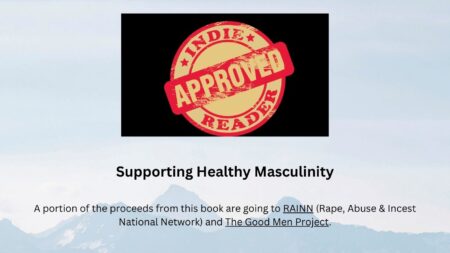79 results for tag: Change Behavior
Social Impact Authors Helping To Change Our World
As part of my series about “authors who are making an important social impact”, I had the pleasure of interviewing Michael Swerdloff.
Yitzi Weiner A “Positive” Influencer, Founder & Editor of Authority Magazine, CEO of Thought Leader Incubator ·Published in
Authority Magazine.
Feb 26, 2025
Social Impact Authors - How & Why Michael Swerdloff Is Helping To Change Our World
Michael Swerdloff has been a Counselor, Coach, Social Worker, Community Organizer, Educator, Writer, DJ, and Reiki Master for over twenty-five years. He laughs often, hugs deeply, and practices meditation, ...
Author Book Review - Raised by Wolves, Possibly Monsters
Overall Rating: 







“Change is real and possible; it really is. I am living proof.”My final read of the year! And this time around, it’s a memoir that I wasn’t quite sure I was going to finish when I first started it if I’m honest (the trigger warnings are certainly triggering.) It’s a hard read, I’ll not lie, but it’s raw, it’s honest and I really appreciated Michael’s courage in sharing his story. With so many horrific experiences and so many reasons to judge and to hate, not many people would. Very happy to be sharing my review of Raised By Wolves, Possibly Monsters!...
You Can’t Change Anyone — You Can Only Make Them Think
We can't change anyone who doesn't want or isn't ready to change. While I was still doing drugs and drinking alcohol, many people wanted me to change. They needed me to change.
When I got sober in 1989, I often heard a woman named Claire share, "I didn't see the light. My ass was dragging, and I felt the heat"! This was me. The walls were closing in, and I felt like I had no options. I know that I am not alone in this experience of people wanting or needing someone to change, but they weren't ready or willing.
My more than twenty-five years as a social worker, counselor, and coach have demonstrated that we can't change anyone who isn't invested in change. But we can inspire them, offer them a new perspective, and provide safety, support, and love....
Brought Back to Life By A Dance Class
What do we need to be brought back to life? We all get stuck from time to time. The "sparkplug" differs from person to person and depends on where we are in our lives and the circumstances we are experiencing.
"I don’t have a lot of wisdom to offer, but I do know that showing up was an act of self-care." Daphnée...
How Iceland Got Teens to Say No to Drugs – The Icelandic Model
I become excited and inspired when I see concepts, ideas, and methods that I use in my work validated by international scientists and authors. The two articles that I have included excerpts from offer alternative ideas about the use and abuse of alcohol, tobacco, and drugs. From my experience, combining these two perspectives is the core of my work, supporting and facilitating shifting patterns, behaviors, obsessions, and addictions.
I typically integrate these three principles/methods for shifting unwanted patterns and behaviors.
- Exercises supporting the discovery and understanding of our patterns and thinking.
- Explore what we feel connected to, or the lack of connection, to people, animals, friends, family, and our environment. Create a plan to improve and expand our connections. (Read Johann Hari's views on addiction and connection at the bottom of this post.).
- Brainstorm interests, passions, and activities that we have either enjoyed in our past or present or would like to explore, including creative expressions, physical activity, opportunities to connect with the natural world, or anything that inspires or stimulates us. We follow the brainstorming process by implementing some of these interests and activities into our lives before or during launching into facilitating the shift in the unwanted behaviors. In short, let's find out what will inspire and stimulate you to replace the patterns, behaviors, and addictions that are problematic. (This parallels the process Harvey Milkman researched in the U.S. and implemented in Iceland, discussed in the main article focusing on teens and addiction.)
Trauma Is Not Your Fault, But Healing Is Your Responsibility
 Book Release: Raised by Wolves, Possibly Monsters - From Mobster to Reiki Master, A Memoir of Awakening & Transformation. Find out more about this exciting new book here.
Book Release: Raised by Wolves, Possibly Monsters - From Mobster to Reiki Master, A Memoir of Awakening & Transformation. Find out more about this exciting new book here.
We all come into this life with stuff to unpack and learn. Some of us have entered life with more significant challenges than others. It can be said that ALL OF US have endured trauma in one form or another. This can mean being neglected as children, being abused as a child, teen or adult, military, sexual assault and rape, alcoholism and drug addiction, poverty, and racial and cultural issues, just to name a few forms of trauma. We all experience these challenges in different ways. It has become widespread for self-help and pop psychology "gurus" to present pathology as a singular, logical pattern that explains life experiences through a lens that, in all cases, "this means that" and all people experience "this and that" the same. It is false and damaging to the millions of people who read or hear these claims and wonder why it is not valid for them. We have our shared experiences but in our own unique way. That is one of the joys of being human!
No two people experience trauma the same, but there are enough common traits to share and learn from each other and gain support and camaraderie. I can learn from you and vice-versa. I remember when my cousin returned from Vietnam, he would not discuss what happened to anyone. Then, one day, a friend of his who was also a Vietnam vet was over. He talked and talked about what he saw and did for hours. We were all surprised after not hearing him speak about it for more than a paragraph after being home for several years. The same applies to people participating in Twelve-Step or cancer survivor groups. Shared experiences help us feel like we belong and we are not alone. This is important in moving forward through traumatic experiences.
...
Self-Sabotage – I Am Willing To Do Anything… But That
It is very common for clients whom I work with when asked what they are willing to do to grow or improve their situation, to offer a very specific and inspiring response. "I am willing to do anything and everything to make things better!" A part of me gets really excited about their enthusiastic reply. My excitement and optimism still exist after 25 years of this kind of work, knowing that we are about to embark on the first stage of self-sabotage. Self-sabotage can, at times, be really obvious and, at others, very deceptive and tricky.
I take a deep breath and ask them, "Are you willing to do____?" Their enthusiasm and conviction, which were on full display just a moment earlier, disappear. Some combination of resentment, bitterness, fear, and/or anger replaces the enthusiasm. Self-sabotage has now planted its roots and is ready to dig in to do anything and everything except for "that."
 ...
...
 ...
... 






